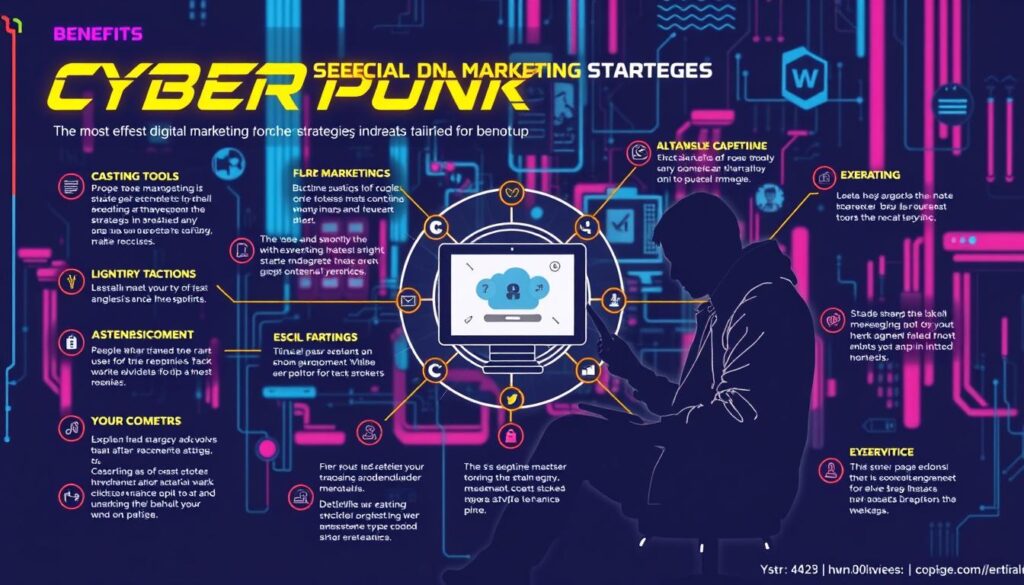Launching a startup is an exhilarating experience, but it’s not without its challenges. A staggering 22% of startups fail due to marketing problems, emphasizing the importance of effective marketing initiatives. At CoWrit Technologies Inc, we’ve seen firsthand how a well-crafted marketing strategy can make all the difference.
We understand that as a startup, resources are limited, and every decision counts. That’s why we’ll explore proven marketing approaches that can help your business gain visibility and attract customers. From crafting a compelling brand identity to leveraging cost-effective marketing tactics, we’ll provide actionable insights to boost your online presence.
Key Takeaways
- Understand the importance of effective marketing for startups
- Learn how to create a comprehensive marketing plan
- Discover low-cost, high-impact marketing approaches
- Explore successful marketing strategies used by startups like Dropbox and Slack
- Gain insights into maximizing limited resources for marketing
Why Digital Marketing Matters for Startups
As startups look to make their mark, they quickly realize that effective digital marketing is not just beneficial, but essential for their survival and growth. Digital marketing allows startups to identify and target their niche market segments effectively.
Brand Identity and Awareness
Through digital marketing, startups can build a strong brand identity and increase awareness about their products or services. By leveraging various digital channels, they can reach a wider audience and establish a unique presence in the market.
Customer Acquisition and Retention
Digital marketing strategies enable startups to acquire new customers and retain existing ones by creating engaging content and offering personalized experiences. By analyzing data on consumer behavior, startups can refine their marketing efforts to better meet customer needs.
Market Positioning and Feedback Loop
Effective digital marketing helps startups position themselves competitively in the market. It also creates a feedback loop, allowing them to gather insights from customers and make informed decisions to improve their business strategy and products. For more insights on why digital marketing is essential for startups, check out this article.
Creating an Effective Digital Marketing Plan
To succeed in the digital age, startups must create an effective digital marketing plan that aligns with their business goals. This plan serves as a roadmap, guiding marketing efforts and ensuring that resources are utilized efficiently.
Branding and Storytelling
A strong brand identity is foundational to a successful digital marketing strategy. Branding and storytelling help startups connect with their audience on an emotional level, fostering loyalty and advocacy. By crafting a compelling narrative, startups can differentiate themselves in a crowded market.
Target Audience Analysis
Understanding the target audience is critical for developing a marketing strategy that resonates. Target audience analysis involves researching demographics, preferences, and behaviors to create buyer personas. This insight enables startups to tailor their marketing efforts, increasing the likelihood of engagement and conversion.
Allocating Resources Efficiently
Startups often have limited marketing budgets and small teams, making it essential to allocate resources wisely. Prioritizing channels and tactics based on their potential ROI and alignment with business goals is crucial.  By leveraging cost-effective digital marketing tools and platforms, such as social media and content marketing, startups can maximize impact while keeping costs low.
By leveraging cost-effective digital marketing tools and platforms, such as social media and content marketing, startups can maximize impact while keeping costs low.
Effective resource allocation involves considering the time investment required for different marketing activities. Some strategies, like SEO, take longer to show results but provide sustainable long-term benefits. Startups should start with low-cost, high-impact strategies before investing in more expensive channels like paid advertising.
Best Digital Marketing Strategies for Startups

Effective digital marketing is not just about having an online presence; it’s about creating a marketing strategy that drives real results for your startup. To achieve this, it’s crucial to understand the most effective digital marketing strategies that can be implemented with limited resources.
Low-Cost, High-Impact Approaches
For startups, budget is often a constraint. However, this doesn’t mean you can’t make a significant impact. Low-cost, high-impact approaches such as leveraging social media platforms, creating engaging content, and utilizing email marketing can be highly effective. A/B testing is also vital to include in your digital marketing campaigns to optimize performance and improve results.
By focusing on these strategies, startups can drive traffic to their website and generate leads without breaking the bank.
Measuring Success: Key Performance Indicators
To ensure the success of your digital marketing efforts, it’s essential to establish clear Key Performance Indicators (KPIs). These KPIs will help you measure the effectiveness of your strategy and make data-driven decisions. Tracking both leading indicators (such as website traffic and social engagement) and lagging indicators (like conversions and customer acquisition cost) provides a comprehensive view of your marketing performance.
Regular analysis of your marketing data allows you to quickly adjust your strategies, doubling down on what’s working and pivoting from underperforming areas.
Content Marketing: Building Authority and Trust
By leveraging content marketing, startups can effectively address the needs and pain points of their ideal customers, fostering a loyal following. This approach not only helps in generating leads but also drives sales by establishing the brand as a thought leader in the industry.

Blog Posts and Thought Leadership
Blog posts are a cornerstone of content marketing, allowing startups to showcase their expertise and thought leadership. By creating informative and engaging content, startups can attract and retain a clearly defined audience.
Creating Compelling Video Content
Video content has emerged as a powerful tool for startups to connect with their audience. By creating compelling narratives and showcasing their products or services in action, startups can enhance engagement and conversion rates.
Content Distribution Channels
Creating great content is only half the battle—strategic distribution is equally important. We recommend identifying the primary content distribution channels where your audience spends time online. Email newsletters and social media platforms are effective channels for startups. Email newsletters deliver content directly to interested subscribers, while social media platforms can amplify your content’s reach.
- Email newsletters remain one of the most effective content distribution channels for startups.
- Social media platforms can amplify your content reach, but each platform requires tailored formatting and messaging.
- Consider partnerships with industry publications, podcasts, or complementary businesses to expand your content’s reach.
Search Engine Optimization (SEO) Fundamentals

For startups, understanding and implementing SEO fundamentals is key to increasing visibility and reaching your target audience effectively. A well-crafted SEO strategy can significantly enhance your online presence, driving more traffic to your website and ultimately contributing to your business’s success.
Keyword Research and Implementation
Effective SEO begins with thorough keyword research and implementation. This involves identifying relevant keywords and phrases your target audience uses when searching for products or services like yours. By incorporating these keywords into your website’s content, you can improve your search engine rankings and attract more qualified leads.
On-Page and Technical SEO
On-page SEO involves optimizing individual web pages to rank higher in search engines. This includes using keywords strategically in titles, meta descriptions, and headings. Technical SEO, on the other hand, focuses on improving your website’s backend structure and performance. Ensuring your website is mobile-friendly, has fast loading speeds, and is secure (HTTPS) are critical technical SEO factors.
Building Quality Backlinks
Building quality backlinks is a crucial aspect of SEO. We recommend focusing on earning natural backlinks through creating exceptional, linkable content rather than using questionable link-building tactics. Guest posting on industry blogs and publications is an effective strategy for startups to build quality backlinks while reaching new audiences. Additionally, creating original research, comprehensive guides, or unique tools can naturally attract backlinks from other websites in your industry.
By prioritizing these SEO fundamentals, startups can improve their search engine rankings, drive more traffic to their site, and support their overall marketing efforts. A comprehensive SEO strategy is essential for establishing a strong online presence and achieving long-term success.
Social Media Marketing for Startups
Social media marketing offers startups a powerful platform to connect with their audience, build brand awareness, and drive customer engagement.

Choosing the Right Platforms
With numerous social media platforms available, selecting the right ones for your startup is crucial. Consider where your target audience is most active. For instance, Jasper, an AI marketing tool, has successfully grown a Facebook community to over 74,000 members.
Creating Engaging Content
To capture the attention of your audience, your content must be engaging and relevant. Utilize a mix of promotional, educational, and entertaining content to keep your customer base interested. Notion, for example, leverages Reddit to share productivity tips and templates.
Community Building and Engagement
Building an engaged community around your startup creates loyal advocates who promote your brand and provide valuable feedback. We recommend actively participating in conversations, creating branded hashtags, and hosting live events to boost engagement and position your startup as customer-focused.
- Building an engaged community creates loyal advocates.
- Actively participate in conversations by responding to comments.
- Creating branded hashtags helps expand your reach.
- Hosting live Q&A sessions can boost engagement.
- Dedicated community groups provide spaces for deeper customer connections.
Email Marketing: Nurturing Customer Relationships

By leveraging email marketing, startups can create a robust framework for customer engagement. This strategy is pivotal in nurturing customer relationships, driving loyalty, and ultimately, boosting conversions.
Building Your Email List
Building an email list is foundational. Startups can achieve this by offering valuable content, such as e-books or webinars, in exchange for email addresses. For more insights, visit our email marketing for startups resource.
Segmentation and Personalization
Email marketing becomes more effective when combined with segmentation and personalization. By categorizing your list based on user behavior and preferences, you can tailor your messages to resonate with different segments, enhancing engagement.
Automation and Drip Campaigns
Campaigns can be streamlined through automation. Drip campaigns, which involve sending a series of emails over time, are particularly effective for nurturing leads. Most marketing platforms offer automation features that make creating sophisticated workflows accessible.
In conclusion, marketing through email is a powerful tool for startups. By building a list, segmenting and personalizing content, and automating campaigns, startups can significantly enhance their marketing efforts.
Paid Advertising and Retargeting

To maximize their marketing efforts, startups often turn to paid advertising strategies. Paid advertising allows startups to reach a wider audience, drive traffic to their website, and generate leads. By leveraging the right paid advertising channels, startups can significantly enhance their online visibility and attract potential customers.
Pay-Per-Click (PPC) Campaigns
Pay-Per-Click (PPC) campaigns are a highly effective way for startups to drive targeted traffic to their website. By bidding on relevant keywords, startups can ensure that their ads appear in search engine results, reaching users who are actively searching for their products or services. PPC campaigns offer measurable ROI, allowing startups to track the effectiveness of their marketing efforts.
Social Media Advertising
Social media advertising is another powerful tool for startups. Platforms like Facebook, LinkedIn, and Twitter offer sophisticated targeting options, enabling startups to reach their ideal audience with precision. By creating engaging ad content, startups can drive conversions and build brand awareness among potential customers.
Retargeting Campaigns
Retargeting campaigns allow startups to reconnect with website visitors who showed interest but didn’t convert. By using tracking cookies, startups can serve targeted ads to these users as they browse other websites, encouraging them to return and complete a conversion. Retargeting is particularly effective because it targets users who have already demonstrated interest in the startup’s offerings.
- Retargeting campaigns significantly increase conversion rates by reconnecting with interested website visitors.
- We recommend implementing retargeting as one of your first paid advertising strategies for the highest ROI.
- Segmented retargeting campaigns allow for more personalized messaging based on specific pages visited or actions taken.
- Offering special incentives in retargeting ads can help overcome initial hesitations and drive conversions.
- Frequency capping is crucial to prevent ad fatigue and negative brand associations.
Influencer and Partnership Marketing

The power of influencer and partnership marketing lies in its ability to connect startups with their target audience through trusted voices and complementary businesses. By leveraging these strategies, startups can enhance their brand visibility and credibility.
Finding the Right Influencers
To successfully implement influencer marketing, startups need to identify influencers who align with their brand values and target audience. This involves researching influencers’ content, engagement rates, and audience demographics to ensure a good fit.
We recommend looking for influencers who have a genuine interest in your products or services and can create authentic content that resonates with their followers.
Creating Mutually Beneficial Partnerships
Partnership marketing involves collaborating with other businesses to achieve common goals. Startups can benefit from partnering with complementary businesses to expand their reach and offer more comprehensive solutions to their customers.
Some effective partnership strategies include co-marketing initiatives, such as joint webinars and co-branded content, as well as integration partnerships where products work seamlessly together. When approaching potential partners, focus on the value you can provide to their audience rather than just what you hope to gain.
By implementing these marketing strategies, startups can not only increase their visibility but also build strong, lasting relationships with their target audience and other businesses in their industry.
Building Online Communities and Word-of-Mouth
Fostering online communities is an effective strategy for startups to promote their products and services. By creating a loyal customer base, startups can drive growth through word-of-mouth marketing.
Leveraging Existing Communities
One approach to building online communities is to leverage existing ones. Startups can participate in online forums and social media groups related to their niche, providing value and establishing their brand as a thought leader. This helps to build credibility and trust with potential customers.
Creating Your Own Community Space
Alternatively, startups can create their own community space. This could be in the form of a private Facebook group, a forum on their website, or a Slack channel. By creating a dedicated space for customers to interact and share their experiences, startups can foster a sense of belonging and encourage customer loyalty.

Referral Programs and Customer Reviews
Referral programs and customer reviews are also crucial for building online communities and promoting word-of-mouth marketing. Structured referral programs turn satisfied customers into active promoters by providing incentives for successful recommendations. For example, Dropbox’s referral program helped them grow from 100,000 to 4 million users in just 15 months.
| Program | Incentive | Result |
|---|---|---|
| Dropbox Referral Program | Additional Storage Space | Growth from 100,000 to 4 million users |
| PayPal Referral Program | $20 for Referrer and Referee | 7-10% daily growth |
By implementing these strategies, startups can build a loyal customer base and drive growth through word-of-mouth marketing.
Events, Webinars, and Experiential Marketing
In the competitive startup landscape, events, webinars, and experiential marketing offer unique opportunities for engagement and brand building.

Hosting Webinars and Virtual Events
Hosting webinars and virtual events is an effective way to showcase your products or services to a targeted audience. It allows for real-time interaction, building trust and establishing your startup as an authority in the industry.
To maximize the impact, focus on providing valuable content that resonates with your potential customers. This not only helps in generating leads but also in nurturing them through the sales funnel.
Participating in Industry Events
Participating in industry events provides startups with opportunities to network, gain visibility, and connect with potential customers, partners, and investors. It’s essential to research events where your target audience will be present and focus on quality interactions rather than quantity.
Having a polished elevator pitch, a compelling demo, and a follow-up strategy maximizes the return on your time investment at industry events. This strategic approach ensures that your startup makes a lasting impression and achieves its desired outcomes.
Conclusion: Testing, Optimizing, and Scaling Your Strategy
The journey to successful digital marketing for startups involves continuous testing, learning, and optimization. As we’ve discussed throughout this article, a well-crafted marketing strategy is crucial for achieving sustainable growth in today’s competitive business landscape.
To maximize results, it’s essential to adopt an experimental mindset, regularly testing different approaches to see what resonates best with your specific audience. A/B testing key elements like email subject lines, ad copy, landing page designs, and call-to-action buttons can significantly improve conversion rates over time.
As your startup grows, gradually scale successful marketing strategies while maintaining the agility to pivot when market conditions or customer preferences change. This balanced approach allows you to capitalize on what works while remaining adaptable to new opportunities and challenges.
At CoWrit Technologies Inc, we help startups develop and implement comprehensive digital marketing strategies that drive sustainable growth through our services in content writing, website development, and marketing campaigns. For startups ready to take their marketing strategy to the next level, our team offers expert guidance and support—reach out via WhatsApp at +44-7822010953 to discuss how we can help your business grow.
Remember, the most successful startup marketing strategies are those that authentically reflect your brand values while meeting your customers where they are. By embracing this approach and continually optimizing your strategy over time, you’ll be well on your way to achieving long-term success in the ever-evolving digital landscape.


